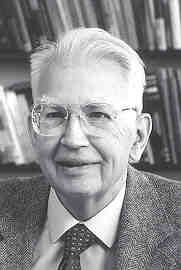Coase, Ronald (Environmental & Earth Science)
Coase, Ronald
Ronald H. Coase (1910-), a renowned British economist, received the Nobel Prize in Economics in 1991 "for his discovery and clarification of the significance of transaction costs and property rights for the institutional structure and functioning of the economy". In his article, The Problem of Social Cost (1960), he proposed that well-defined property rights could overcome the problems of externalities because many environmental problems arise form poorly defined or lack of property rights. His work resulted in the Coase Theorem, a cornerstone of environmental economics. Coase argued that a polluter and an affected party could reach a mutually beneficial bargain if the damage from pollution exceeded the polluter’s net return from the sale of the good generating the pollution; a payment from the affected party to the polluter would reduce the pollution. The argument assumes that transaction costs are zero.
Professor Coase is currently Clifton R. Musser Professor Emeritus of Economics at the University of Chicago Law School. He has been affiliated with the University of Chicago since 1964. Earlier he served on the faculty of the Dundee School of Economics and Commerce (1932-1934), the University of Liverpool (1934-1935), the London School of Economics (1935-1951), the University of Buffalo (1951-1958), and the University of Virginia (1958-1964).
He was editor of the Journal of Law and Economics (1964-1982). He was the founding president of the International Society for New Institutional Economics (1996-97). He is the research advisor to the Ronald Coase Institute.
Further Reading
Ronald H. Coase - Autobiography (Nobel Foundation)
The Ronald Coase Institute Homepage
